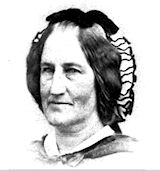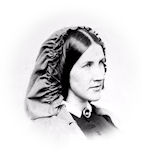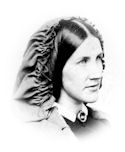 From Mother.
From Mother.
8 Brevoort Place, May 13th.
My Dear Girls: I have just come up to my own room from breakfast, and from the reading of your most welcome and satisfactory letter, my dear Eliza, written off West Point; and now before anything calls off my attention, or any visitors arrive to “sit the morning,” I have seated myself to thank you both, Georgy for her’s of the 8th, received on Saturday, and yours E., this morning. It is very thoughtful and kind in you to write at all, and I wonder how you can do it in the midst of such scenes! and yet how miserable it would be for us if we did not hear directly from your own pens of your welfare. I am as much and more at a loss than yourself where to begin to tell you all I want to say. .. . Miss H. and a lady friend were ushered in upon me this morning, the latter wishing to know all the particulars about the position of lady nurses down at Yorktown, and what was particularly required of them, as she had started from home with a “strong impulse” to offer her services. All I could tell her was that “a desire to be useful, plain common sense, energetic action, fortitude, and a working apron, were some of the absolute essentials!—not to be a looker-on, but a doer—to take hold with a good will and a kind heart. She left with a feeling that perhaps she could be quite as useful without going down to Yorktown! I have no doubt she can. . . . Charley must have seen you before this. He will tell you all about his getting off and our being on board with him. He took a quantity of things for himself and you girls, which I hope you may find useful. I told him to help himself from the long basket, and use anything he wanted for himself or others on the voyage. The fruit, I was afraid, might not keep. The fresh eggs were from Fishkill, especially for you, E. I long to hear from Charley all about his trip, and I wonder much whether he will come back in the boat or stay behind. I think it will be better, perhaps, for him to make the trip back here, and then return to stay with you. But this you will, of course, arrange among you. . . . So you have both seen Fortress Monroe, and landed, in spite of Stanton and his strict rules! I am glad of it. You are certainly highly favored girls, and I must give way to a little motherly feeling and say you deserve it all. You cannot imagine what our anxieties have been since the commencement of McClellan’s move to push the enemy to the wall. The evacuation of Yorktown took us by surprise, and somehow or other we do not seem to get up the proper degree of enthusiasm about it. The subsequent doings, with the destruction of the much dreaded Merrimac, have not called forth the jubilant demonstrations throughout the cornmunity here that I supposed such news would produce. They seem to be waiting for the occupation of Richmond to burst out with a joyous and prolonged expression of their feelings. Think of our troops being so near the desired “on to Richmond!” We can scarcely realize all that has happened since our parting that Sunday morning. Oh! how lonely and sad I felt when I turned away from the window to the empty room, and the deserted little beds in the corners at the Ebbitt House. But Hatty and I made the most of each other. I did not leave her that day. . . . A young gentleman sent in his card last evening,—Julian T. Davies—and followed in. He came to see Mrs. Howland, as her name and Miss Woolsey’s were mentioned as having arrived here in the Ocean Queen. Mr. Hone had called for the same reason, and Mrs. Russell, I believe. Young D. said the report that Colonel Howland was wounded went up one aisle of the church in Fishkill, and immediately after, the contradiction went up the other, but he called to know what we had heard from you. You cannot tell what a relief and comfort your letter this morning gives us. I drove out on Saturday to Astoria with your Uncle E. Took an early dinner there, and then went up to Mary’s and sat with her till six o’clock. Found her perfectly well, and the children lovely. . . . Abby mails you the daily papers constantly; they must be taken by other eager hands. Do let us know if any men from the 16th are brought here. We would like to find them out. Jane is untiring in her visits and attentions at the Hospitals—Abby at her shirt-making and cutting out for others to make, and doing all sorts of good things in the intervals, and doing all the running for the family generally. We cannot prevail on her to take time or money to buy herself a spring bonnet or dress. My love to Charley. I do not write him, as he may be on his way back. Hatty is still in Philadelphia. I am so glad you have Lenox Hodge at hand. It is a real comfort to think of it—tell him so, with my love. Give a great deal of love to our own Joe from us all. We shall be so anxious now to hear all the time. We grasp at every paper. . . . Farewell, dear girls, with a kiss to each, and to Charley two, if with you. We look anxiously for the Daniel Webster. Dr. Buck came and told us all about you—exalted praises!





